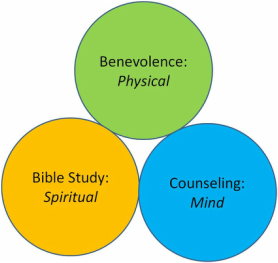
I want to encourage that an outreach program be robust. By being robust I believe it will increase the odds of long term success in fulfilling the great commission. There is an idea that through benevolence or helping people can be used as an outreach to bring people to Christ. Benevolence can also be misused with good intentions that can enable people to continue to destroy themselves. Cloud and Townsend stated in "How People Grow," that "Encouraging someone who has no power to change is the worst thing that could be done." I have seen individuals working with different benevolence efforts who wind up burning themselves out while attempting to help people. Individuals that were helped after getting whatever they could, go to the next congregation (opportunity) to see what they can get from them. The person that was being helped becomes angry when they are no longer being taken care of by those "helping them."
Yes, it is very important they become born again, and reconciled into a relationship with Christ.
Many times individuals who are seeking help are going through issues at a much deeper level that needs to be addressed. Yes, it is very important they become born again, and reconciled into a relationship with Christ. The truth is that many times people with addictive thinking have a desire to change but are without the means to change. They give their lives to Christ and are not able to stop their former habits. Some individuals just want to have their bills paid because their money was spent supporting their destructive habit. Their processing in their mind is in need of change, the physical damage that has taken place takes time to heal (approximately 18 months according to SAMHSA). If a congregation enters into helping someone with the idea that they just need to "stop it" they fail to recognize the disease of addiction. You cannot guilt the individual, threaten them by letting them know "if you don't change they will burn in Hell." I have seen that approach used in my life over and over again with the same results: 1) Person comes in for help, 2) they go through a process with paperwork and talking with different people (Preacher, Church Secretary, an Elder or Deacon depending on the congregation), 3) they get help and agree to go through a process of Bible study, 4) after a time they become a Christian and a time of celebration takes place 5) maybe they have continued Bible study, 6) individual has relapse and members either encourage them or condemn them, 7) they vow to do better and need more help, 8) they relapse again and someone has more Bible study with them so they know they are doing wrong and must change. Eventually other people in the congregation no longer believe that person is capable to change.
Sometimes a congregation will send the individual to a faith based rehab center for treatment and pay for their treatment. Unfortunately those individuals can leave those centers without going through the treatment program and the money spent is gone. They come back to the area that they came from and then come back to get more help. Sometimes they stay through the treatment program and do well while they are there and when they come back the are in the same environment where they were and eventually relapse. It is not about being strong and having the will to quit. It is about recognizing and learning about what is going on with their addiction process. Receiving a Biblical holistic approach includes counseling. There are individuals with opiate addictions that use antagonist treatment to stop using, and according to SAMHSA the success rate when combined with counseling is greatly increased.
Approaches that only deal with the physical (heart) and spiritual (soul) are like a tricycle with two wheels. Likewise an individual who only goes to secular mental (mind) counseling misses the holistic mark of the heart and soul referrals can be made depending upon the faith or lack thereof of the State licensed counselor. I believe in taking a holistic Biblical approach in treatment of individuals that is the heart, soul and mind. This means finding a coordinated balance of physical help (benevolence), Bible study and mental health Christian counseling.
This multi-approach will be helpful for a Benevolence program to find support in managing their area of work or even an Eldership to find support in approaching an individual with Grace and love. Simply stated, if an individual wants their light bill paid but doesn't want a Bible study AND counseling then they are not ready for real change. This is not judging someone to condemn them, it is saying "no" to someone who is set themselves for destruction. The mission is to "seek and save the lost," not enable them to continue a path of destruction. Some individuals who are seeking help are going through the dance that has been learned to manipulate a benevolence system or a person who gives them support. The result is the addict will taking them for everything they can get. What happens when they don't get what they want? Cry, blame, accuse, guilt, shaming... manipulation! Turning someone away does not mean they are not loved.
I encourage those that want to develop an outreach program ensure it is robust.
Yes, it is very important they become born again, and reconciled into a relationship with Christ.
Many times individuals who are seeking help are going through issues at a much deeper level that needs to be addressed. Yes, it is very important they become born again, and reconciled into a relationship with Christ. The truth is that many times people with addictive thinking have a desire to change but are without the means to change. They give their lives to Christ and are not able to stop their former habits. Some individuals just want to have their bills paid because their money was spent supporting their destructive habit. Their processing in their mind is in need of change, the physical damage that has taken place takes time to heal (approximately 18 months according to SAMHSA). If a congregation enters into helping someone with the idea that they just need to "stop it" they fail to recognize the disease of addiction. You cannot guilt the individual, threaten them by letting them know "if you don't change they will burn in Hell." I have seen that approach used in my life over and over again with the same results: 1) Person comes in for help, 2) they go through a process with paperwork and talking with different people (Preacher, Church Secretary, an Elder or Deacon depending on the congregation), 3) they get help and agree to go through a process of Bible study, 4) after a time they become a Christian and a time of celebration takes place 5) maybe they have continued Bible study, 6) individual has relapse and members either encourage them or condemn them, 7) they vow to do better and need more help, 8) they relapse again and someone has more Bible study with them so they know they are doing wrong and must change. Eventually other people in the congregation no longer believe that person is capable to change.
Sometimes a congregation will send the individual to a faith based rehab center for treatment and pay for their treatment. Unfortunately those individuals can leave those centers without going through the treatment program and the money spent is gone. They come back to the area that they came from and then come back to get more help. Sometimes they stay through the treatment program and do well while they are there and when they come back the are in the same environment where they were and eventually relapse. It is not about being strong and having the will to quit. It is about recognizing and learning about what is going on with their addiction process. Receiving a Biblical holistic approach includes counseling. There are individuals with opiate addictions that use antagonist treatment to stop using, and according to SAMHSA the success rate when combined with counseling is greatly increased.
Approaches that only deal with the physical (heart) and spiritual (soul) are like a tricycle with two wheels. Likewise an individual who only goes to secular mental (mind) counseling misses the holistic mark of the heart and soul referrals can be made depending upon the faith or lack thereof of the State licensed counselor. I believe in taking a holistic Biblical approach in treatment of individuals that is the heart, soul and mind. This means finding a coordinated balance of physical help (benevolence), Bible study and mental health Christian counseling.
This multi-approach will be helpful for a Benevolence program to find support in managing their area of work or even an Eldership to find support in approaching an individual with Grace and love. Simply stated, if an individual wants their light bill paid but doesn't want a Bible study AND counseling then they are not ready for real change. This is not judging someone to condemn them, it is saying "no" to someone who is set themselves for destruction. The mission is to "seek and save the lost," not enable them to continue a path of destruction. Some individuals who are seeking help are going through the dance that has been learned to manipulate a benevolence system or a person who gives them support. The result is the addict will taking them for everything they can get. What happens when they don't get what they want? Cry, blame, accuse, guilt, shaming... manipulation! Turning someone away does not mean they are not loved.
I encourage those that want to develop an outreach program ensure it is robust.
